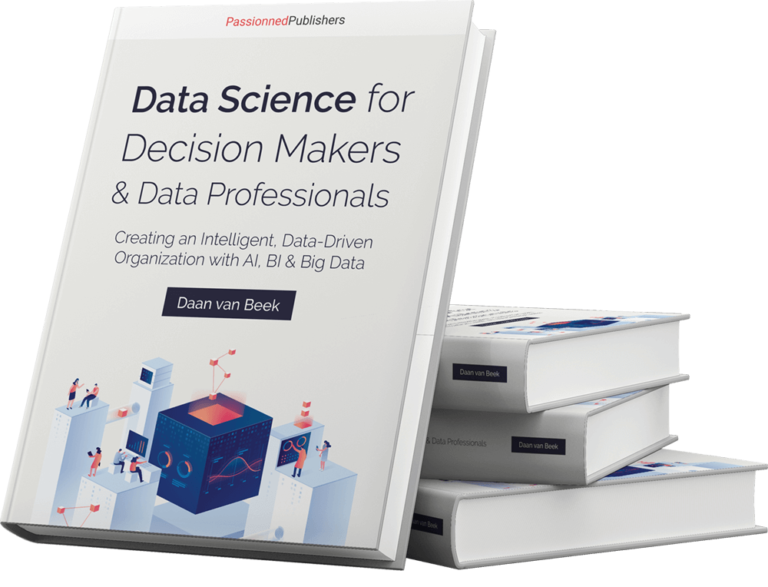AI book: start applying AI and Data Science in 10 steps
Artificial Intelligence (AI) and algorithms have become a fixture in our lives. Many organizations need to implement AI in order to stay competitive. In the brand-new AI book “Data Science for Decision-Makers and Data Professionals”, the author takes you through this field in ten chapters, covering the hallmarks of intelligent, data-driven organizations and the importance of AI. Covered topics range from formulating an AI-first strategy to Big Data architecture, the many types of algorithms, privacy legislation, and ethics. Order the AI book here.
Complete book on AI, machine learning & BI
This Artificial Intelligence handbook provides an up-to-date, complete, and objective perspective on artificial intelligence and everything you need to know to successfully implement AI in your organization. The many case studies illustrate the application of this groundbreaking field and bring the story behind big data, data-driven working, and data science to life.
A bright future for AI
The author of this book envisions a bright future where artificial intelligence (AI) and business intelligence (BI) can contribute to solving complex issues in business and society. He introduces the AI-first principle and describes how the latest developments in the field of data science and machine learning can benefit you, but not without casting a critical eye on them. This book also addresses the dark sides, pitfalls, and failure factors of this novel technology.
AI book product information
Do you prefer the Kindle or paperback edition? Order this Artificial Intelligence book on Amazon.
AI enables data-driven working
Empowered by AI and many kinds of algorithms, organizations can now make essential improvement efforts and effectively innovate to stay ahead of the competition. The most essential algorithms and machine learning models are covered in this unique AI handbook, bringing data-driven working to life. From simple functions and business rules to regression models, random forests, cluster analyses, and Bayesian networks, including so-called genetic algorithms.
This Artificial Intelligence book contributes to a better world
Entirely up-to-date and presented in beautiful hardcover, this edition of the AI book contains many practical examples. The author covers positive and inspiring AI stories that illustrate how AI can benefit people and society when it comes to health, safety, sustainability, and economics. Continuous improvement and innovation using data are two important themes that run through this essential book for ambitious (business) managers, project managers, executives, and their employees.
Universally applicable Artificial Intelligence book
The benefits and importance of AI and data science are highlighted from four perspectives – market, organization, people, and technology. Among other things, the author describes 25 benefits of data science, the umbrella term that covers the various forms of data analysis, machine learning models, and algorithms. This AI book also contains dozens of tips for making better and faster decisions, partially based on algorithms, which makes this unique AI book instantly applicable in every organization. Whether you work at a bank, a healthcare institute, a municipality, in a factory, or on an oil rig.
This AI book covers more than just technology
This AI handbook goes into detail about the technical benefits of AI and data science and the opportunities these fields can offer modern organizations. That doesn’t mean that there’s no focus on the human aspect, however. On the contrary: even in the current age of AI, people remain the biggest success or failure factor. Unlike other AI books, this book also focuses extensively on people as the crucial link between AI and data science management.
Essential reading for colleges and universities
The target audience for this Artificial Intelligence book includes students and teachers at colleges and universities. Many master’s tracks at colleges and universities have already made this book required reading. That doesn’t mean that this book is dry and formal, however: it was written to be accessible, practical, and informal.
Prof. Ribbers’ Testimonial
“The author covers the fields of data science and Artificial Intelligence as topics that, deservedly so, command attention at every level of the organization. Each chapter is also supplemented with practical case studies and best practices”
prof. Piet Ribbers
TIAS Business School
This AI book contains a unique data literacy matrix
Decisions made by people are affected by biases, fallacies, and gut feelings. This topic is extensively covered in this book. Data literacy can become a show stopper if you don’t take it seriously. A unique matrix guides the reader through the levels of data literacy and reveals how your organization scores on this crucial topic. This data literacy matrix makes this AI book essential reading that more than pays for itself. Understanding the nuances of data literacy is critical, as it plays a significant role in bridging the gap between the theoretical promises of AI and its practical applications.
No black-and-white thinking in this Artificial Intelligence book
One of the author’s biggest accomplishments is his ability to excite people for a data-driven future in which algorithms play an increasingly prominent role. This AI book prepares people and organizations for a new age of opportunities, data-driven working, and better decision-making. The author also has high expectations for Augmented Intelligence, which can supplement and upgrade human intelligence. This concept can be a valuable addition to people’s everyday activities.
Important topics in this complete AI book
The complete contents of the book are too wide in scope to list everything here, but the table below should give you a good impression of the contents of the complete AI handbook Data Science for Decision-Makers.
✪ Artificial Intelligence definition
✪ AI roles and functions
✪ Ethics of AI
✪ Augmented Intelligence
✪ AI’s disruptive nature
✪ Datafication of society
✪ Ensemble of algorithms
✪ Data literacy
✪ Self-learning algorithms
✪ Pseudonymization & GDPR
✪ Machine learning models
✪ Explainable AI
✪ Prescriptive algorithms
✪ Origin of algorithms
✪ AI’s social effects
✪ Railway trespassing algorithm
✪ Biases & discrimination
✪ Deep learning
✪ Data analytics & AI
✪ Simulations
✪ Training algorithms
✪ Predictive algorithms
✪ Anonymization & GDPR
✪ Justification for algorithms
✪ AI applications
✪ Confirmation bias
✪ Basic principle algorithms
✪ AI and BI roadmap
✪ Automatic decisions with AI
✪ Forecasting
✪ Data mining and text mining
✪ Internet of Things
✪ AI & big data applications
✪ Pattern recognition
✪ AI codes of conduct
✪ Impact of algorithms
✪ AI for Good
✪ Data Governance
✪ Data quality & AI
This Artificial Intelligence book puts everything in perspective
After reading this AI book, you can put data science, AI, BI, and machine learning models in the right context. You’ll be familiar with the most important types and varieties of algorithms and have a broad but realistic and objective perspective on the possibilities for AI in your organization. The workings of the most important types of algorithms and related terminology are extensively covered in this book. Get a sneak preview of the AI contents in the table below.
✪ Nearest neighbor search
✪ Supervised learning
✪ Unsupervised learning
✪ Business rules
✪ Linear regression
✪ Naive Bayes
✪ Natural Language Processing
✪ Accuracy
✪ Probability
✪ Neural networks
✪ Logistic regression
✪ Gaussian Naive Bayes
✪ Random forest
✪ Text mining
✪ Overfitting and underfitting
✪ Cluster analyses
✪ Image processing
✪ Reinforcement learning
You’ll also have the know-how to share this knowledge with your colleagues and other stakeholders. In short: you’ll know everything you need to know to get started with Artificial Intelligence.
Order this Artificial Intelligence book now
Do you want to make your mark using AI, BI, Big Data, and Data Science? Order the hardcover edition of the AI book “Data Science for Decision-Makers and Data Professionals” now for € 64.95 and start building an intelligent, data-driven organization. Take advantage of the latest insights in the field of artificial intelligence and develop accurate algorithms.
This AI book has also a Kindle version. Order it from Amazon.
About the author: Daan van Beek MSc
 Daan van Beek, the president of Passionned Group, wrote this AI book based on over 20 years of experience as an advisor, teacher, and manager. He’s known as an ambassador of the concept of the intelligent, data-driven organization. He spreads his revolutionary ideas about Data Science, Big Data, BI, and AI during masterclasses, college courses, and training tracks at Passionned Academy. He regularly hosts AI & BI masterclasses around the world, from Amsterdam to Paramaribo and from New York to Singapore. Finally, he teaches AI & Data Science at the premier business schools TIAS and EUR.
Daan van Beek, the president of Passionned Group, wrote this AI book based on over 20 years of experience as an advisor, teacher, and manager. He’s known as an ambassador of the concept of the intelligent, data-driven organization. He spreads his revolutionary ideas about Data Science, Big Data, BI, and AI during masterclasses, college courses, and training tracks at Passionned Academy. He regularly hosts AI & BI masterclasses around the world, from Amsterdam to Paramaribo and from New York to Singapore. Finally, he teaches AI & Data Science at the premier business schools TIAS and EUR.
Reviews about Artificial Intelligence book
Lars Albertema | : Between tasks, I’ve been working on the book, but I already want to share my enthusiasm. The structure, illustrations, wording, and layout of the book reflect the author's solid expertise and experience. He guides the reader very well through the setup and logic behind AI & BI and the added value it can bring to organizations. The pitfalls, prerequisites, and success factors outlined are also very valuable. The author has clearly put himself in the shoes of the reader who wants to apply the subject within their own organization. He presents these prerequisites without diminishing the enthusiasm. Very well done. Undoubtedly, once I’ve read the entire book, I’ll have some constructive critical notes, but so far… I’m glad the author was both willing and able to share his expertise in this way!Erwin Folmer | HAN: I am impressed with how the author manages to clearly explain the approaches to machine learning/AI within a limited scope. The book offers a very nice overview and strikes a great balance by including a bit of technology, but not going too deep. As a possible improvement, you could consider making the distinction between AI and data-driven work, data analysis, and dashboards clearer. The sections on AI could even be beautifully combined (and supplemented) into a book on the fundamentals of AI and Data Science (analysis, AI, visualization) including data engineering. And again, at the intersection of technology and business.
Hans ter Braak | Director: The book is very easy to read because it is written in clear language. That is what appealed to me the most. It is also a confirmation of the knowledge I have gained over the years in BI/AI projects. I think chapters 1 to 7 and section 9.2 form the core of the story, the topics of the remaining chapters are also described in less detail but in more of an overview of the latest trends.
Alexander Proost | : I am still fairly at the beginning because I want the material to be well absorbed, this means that I should not read it just before sleeping. Even though I am only on chapter 3 so far I find the book very interesting because it has a clear description and good practical examples. I also like the illustrations, this helps me to understand better while reading. Even though I have not finished it yet, I have already recommended it to colleagues. If I find any points that could be improved I will pass them on to you.
Rob van der Heiden | : I am still reading this Artificial Intelligence book but I would like to already say in advance that it is easy to read, and even easy to follow for a sales person. My employer has its own data capability but we are still struggling to strike the right chord with prospects/customers. I want to change that with the help of this book, it really is a nice piece of work.
Patrick Veld | Real estate company: I have read this book until the last page. I find it has an enlightening explanation of what an "intelligent and data-driven organization" is and what it isn't. It is illustrated with practical examples. The mix between theoretical models and practice is well balanced. I find the introduction and 'The hands and feet of the intelligent organization' (chapter 5) most valuable. As an improvement point, I would find a step-by-step plan or overview valuable to get started with this in concrete terms.
Renee Musch MPIM | MvR & Partners: I am very positive about this handbook AI because all topics are covered briefly and powerfully without too many technological terms. It is well-organized and understandable, and as far as I am concerned also engaging because of the case histories among other things. The first chapters (1 to 6) appeal to me the most, chapter 9 is also good. Chapters 8 and 9 are well concrete. Chapter 10 could be more "trend watching," but really everything is in the book so it is mostly complete.



